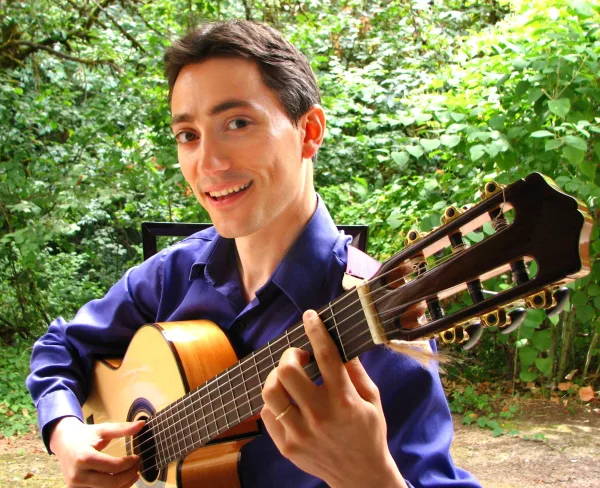Aaron Wolf's Conscious Music Coaching
About
I help my students go beyond common exercises and theory to include creativity, critical thinking, emotional awareness, and understanding of the psychology and science of music. Real understanding of things like rhythm and harmony doesn't come from only going through the motions or knowing names and symbols. Musicianship involves exploring how music plays with our expectations, how different sounds affect our emotions, and how we can use this understanding creatively and expressively.
My formal training includes a classical guitar degree and lots of experience with other styles. I spent a couple years in a full-time pop/rock/jam band. I've reviewed hundreds books on guitar and music education. I've taught for over 20 years.
As an independent teacher, I adapt my lessons to on whatever provides the most intrinsic motivation and deeper insights for each student.
Specialties
Frequency
Clients age
Coaching topic
Previous coaching experience
Photos and videos





Reviews
Daniel W.
Frequently asked questions
What is your typical process for working with a new student?
I always do a free intro lesson. I know that most students, whether beginners or advanced, have never learned about the sorts of insights I provide, so I'm usually excited to share insights with people about how music really works.
So, intro lessons usually last a full hour, and I do some mix of asking students to think critically about how music really works, how strings vibrate etc. or to engage with the core elements of rhythm or talk about the creative process. Whether or not students continue with me, I hope they get real value out of the free intro lesson.
Most of all, I want everyone to know that they don't need to master every advanced technique or know all the jargon in order to be creative and musical. I don't like how most people treat music like some game with rules to learn. Music is open-ended creativity, and we just need to learn how it fits into our perceptions, social conventions, and basic psychology.
Because I have so much I want to share, I always have to remember to not overwhelm students at first. I work to get them a sense of my teaching style but still be human and acknowledge that it's hard to get to know each other in one session. I work to leave enough time to discuss any questions and talk about long-term goals.
What education and/or training do you have that relates to your work?
I took lessons myself for years, recorded several albums, toured with a band, got a classical music degree, worked for years in a guitar shop, reviewed 800+ guitar methods and other books, have taught all sorts of students over more than 15 years, and nearly started a PhD in cross-cultural musicology (I gave up that idea because I got wrapped up in building a non-profit organization working to fund creative work that is made available freely to the world under Creative Commons licenses and such, like Wikipedia I want to see support for fully shareable, open music education as opposed to locked-down all-rights-reserved traditional resources).
Do you have a standard pricing system for your lessons? If so, please share the details here.
I give discounts for longer lessons, and I offer discount options for students with financial need. I also will consider bartering in some cases. Although my rates are competitive for highly-experienced and qualified instructors, I'm always willing to discuss options for discounts.
How did you get started teaching?
I've been teaching others all my life, helping classmates in school, mentoring younger students, and so on. My own guitar teacher encouraged me to start teaching guitar lessons after a good portion of our lessons turned into me teaching him things.
What types of students have you worked with?
I've worked with beginners and advanced students, aged 3 through 75 and from all sorts of backgrounds with all sorts of interests.
What advice would you give a student looking to hire a teacher in your area of expertise?
Look for teachers particularly experienced and dedicated to teaching rather than judging by performance experience. Teaching is a different sort of skill.
Today there are great options for learning outside of lessons: supportive online forums, videos, books, computer software etc. The value of a teacher is in having stronger feedback and coaching with personal attention. Make sure to find a teacher with interests and personality that fit you, but don't assume that teachers are set in their ways. A good teacher recognizes that lessons are a partnership that relies on consideration and communication on all sides. Be comfortable asking any questions at all, such as about a teacher's strengths and weakness, their own learning process
A good teacher will give clear and sincere answers that will help you figure out if they are a good fit for you.